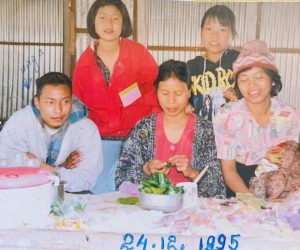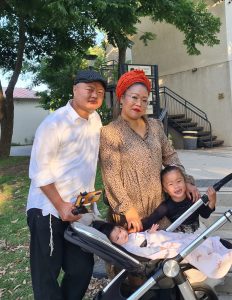
Esther’s Story: The power of perseverance and self-acceptance
Growing up in Mizoram as a member of Bnei Menashe in the mid-nineties certainly came with difficulties. You would typically be teased by other kids for being Jewish and mocked for “not believing in Jesus.” That was certainly the case for Esther Kolnoy before she made aliyah at age 15. But when she did finally arrive to the Holy Land in the year 1999, along with her parents and two siblings, she found herself in a high school that spoke an entirely different language and in a program that required her to take Hebrew lessons and conversion classes until 10pm every night. Esther didn’t know it at the time, but several years later, she would be the first Bnei Menashe social worker in Israel.
Esther currently lives in Kiryat Arba with her husband and two daughters. She works for the regional council as a social worker and is currently working on a certification in CBT-focused psychotherapy. On occasion, she goes around the country giving workshops to Bnei Menashe communities to help families better integrate and understand the Israeli system.
Despite the foreign traces in her accent, Esther speaks Hebrew like a natural and talks of her past articulately and with grace. There is little reservation and every story comes with a sense of hope. In short, speaking with Esther feels like talking to a celebrity. “Don’t let others define you; you define yourself,” she reiterates throughout our conversation.
Hearing her story is inspiring for anyone listening, but it wasn’t always so easy. Esther came to Israel in the very beginning of the millennium, and there was much less recognition for her community and their needs than there is now. “We stayed with my father’s friend,” she recalls. “We came to Israel as tourists…and then as city residents.” Israel didn’t have much of an infrastructure for the Bnei Menashe members and few translators to help her and others like her in school. “We would sit in class like well-behaved students and not understand a word,” Esther continues.
Esther recalls that the community in Kiryat Arba was very accepting of her and her community. Yet, in other instances, like one trip she took to Jerusalem for instance, the experience was quite different. “People would point and say I wasn’t really from India or mock my language,” she described. “As a teenager, I took it hard.” Yet, despite all the hardships, Esther knew she came to Israel to achieve something. “When you have a purpose,” she describes. “You try every possible way to achieve it. This purpose really helped me succeed.” Esther’s purpose was to earn a degree.
After finishing high school, she did National Service and from there, reached out to Shavei Israel to give her some direction. There was an offer for a subsidized program in social work at the Tzefat Academy and she took it. Though she was still learning the language and was enrolled in a rigorous program, she didn’t seem phased. In hindsight, Esther was glad she learned the field. “[Social work] fits me very well and there’s a real lack of them,” Esther describes. “I tell others often to also go into the field.”
As mentioned before, Esther was the first to complete a degree in social work among the Bnei Menashe community and not long after, she received a job as a social worker back in her neighborhood of Kiryat Arba. If there was any suspicion she would be excluded, it was quickly dismissed. “The staff there greeted me with a huge hug,” she reflects. “They helped me, supported me, encouraged me. We are like a family.”
Today, she has a beautiful family and a promising career. But she makes sure to note she couldn’t have achieved it alone. During the whole process, she was in constant contact with Shavei Israel, guiding her and offering her tools and resources. Yet, she ultimately expresses deep gratitude to her parents, particularly her father for his unwavering support and encouragement. “A lot of my success is due to my parents,” Esther declares. Believing that higher education would open doors, her father would “open his pocket” and didn’t relent until all three of his children eventually got a degree. Esther fondly remembers her father’s encouraging words, “Learn something. Don’t do simple work like me; get a degree so you can work in more respectful work.” His belief in her abilities and determination played a significant role in motivating her to persevere despite the challenges.
Esther’s journey is a testament to the power of perseverance and self-acceptance. Despite facing cultural differences, language barriers, and occasional discrimination, she remained resolute in her pursuit of education. Throughout the interview, she offered valuable words of advice based on her experiences, saying, “If you are different, it doesn’t mean you’re anything less.” Esther ultimately came to Israel to connect to her roots and live her life fully as a Jew. But she also learned the value of determination and pride. As she continues her professional journey, empowering and assisting her own community, she spreads her message to those going through the same journey. “Accept yourself as you are,” Esther concludes “…and just keep going.”
- Esther is on the left
- Esther in on the back, right
By Yonatan Birnbaum – An oleh since 2008, Yoni Birnbaum works for a yeshiva in the old city. Aside from being a dedicated husband and father, he spends his free time biking throughout Jlem and writing for important causes. He can be reached at yonatanbirnbaum@gmail.com













